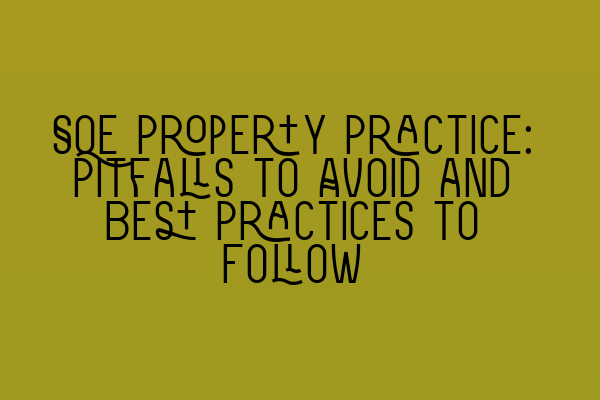SQE Property Practice: Pitfalls to Avoid and Best Practices to Follow
In the dynamic world of property law, it is crucial for solicitors to stay updated with the latest industry practices and avoid common pitfalls that can lead to costly mistakes. Whether you are a seasoned professional or a newly qualified solicitor, adhering to best practices can ensure success in property transactions and safeguard your clients’ interests. In this blog post, we will discuss the key pitfalls to avoid and the best practices to follow in SQE property practice.
1. Thorough Due Diligence
Before advising clients or proceeding with any property transaction, conducting thorough due diligence is essential. This includes reviewing relevant documents, conducting property searches, and investigating any potential legal issues. By conducting diligent research, you can discover any easements, restrictive covenants, or encumbrances that may affect the property’s value or use.
Also, it is important to understand the client’s needs and objectives to tailor your advice accordingly. For example, if the client plans to develop or change the use of a property, you should thoroughly assess planning permissions and zoning restrictions.
Ensuring thorough due diligence not only protects your clients from future disputes but also helps you to provide accurate and comprehensive advice throughout the transaction.
2. Effective Communication
Clear and effective communication is essential in property transactions. As a solicitor, it is your responsibility to keep your clients informed and updated throughout the process. Regularly communicate with clients, providing them with updates on the progress of their transaction and promptly responding to their queries and concerns.
Additionally, effective communication extends to all parties involved in the transaction, including other solicitors, surveyors, and estate agents. Regular and clear communication can help to avoid misunderstandings and delays. Always maintain a professional and polite tone in all your communication, whether in writing or verbal.
3. Accurate Documentation
The importance of accurate and well-drafted documentation cannot be overstated in property practice. All legal documents, including contracts, leases, and agreements, must be precise, comprehensive, and adhere to legal requirements.
Take the time to thoroughly review and understand all documentation before finalizing them. It is advisable to seek assistance from experienced property law specialists or refer to relevant precedents to ensure accuracy and compliance.
Remember, any errors or omissions in the documentation can have serious consequences, including disputes, financial losses, and potential legal proceedings. Double-check all details, including parties’ names, property descriptions, and important dates, to avoid any potential pitfalls.
4. Managing Time and Deadlines
Managing time and meeting deadlines is crucial in property law. Clients rely on their solicitors to complete their transactions efficiently and within the agreed-upon timeframes.
Develop a systematic approach to managing your workload and prioritize tasks accordingly. Create a timeline or checklist to help you keep track of important dates and deadlines, ensuring that all necessary actions are taken within the required timeframe.
Remember to also consider external factors that may affect the timeline, such as the availability of other parties involved or any potential delays in obtaining necessary documents or consents.
5. Continuous Professional Development
In the ever-evolving legal landscape, ongoing professional development is essential for property solicitors to stay updated with new regulations, case law, and industry practices.
Attend relevant seminars, webinars, and training courses to enhance your knowledge and skills in property law. This will not only keep you abreast of the latest developments but also enhance your reputation as a knowledgeable and competent solicitor.
Additionally, consider joining professional organizations, such as the Law Society, that offer resources, networking opportunities, and access to expert advice in property law.
Conclusion
By avoiding common pitfalls and following best practices in SQE property practice, solicitors can ensure smooth and successful property transactions for their clients. Thorough due diligence, effective communication, accurate documentation, efficient time management, and continuous professional development are key elements to consider in achieving excellence in property law.
If you are preparing for the SQE exams, be sure to check out our related articles:
